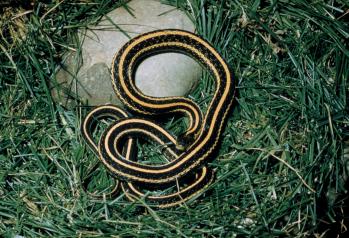
Reptiles are animals with backbones, scaled skins, and lungs. Saskatchewan has examples of three of the five modern kinds of reptiles: two species of turtles, one lizard and nine snakes. All of these reptiles are active only in the warm spring and summer months, and spend the cold time of the year below the frost-line underground. In many species the females are considerably larger than the males, particularly in the older age groups; this larger size means that they can produce more eggs and, in live-bearing species, maintain a higher body temperature, which aids in the proper and more rapid development of the embryos. The province is at the meeting point of the eastern woodlands fauna (e.g., snapping turtle, red-bellied snake) and the western plains fauna (e.g., short-horned lizard, bullsnake, Western rattlesnake). All species are on the northern margins of their distributions. Twelve species are confirmed members of the provincial fauna (see Table REP-1).
The large snapping turtle and the smaller but more numerous painted turtle occur in the rivers of the Missouri drainage and in large permanent ponds in the southeast. The painted turtle occurs as far north as the Saskatchewan River and Duck Mountain. Both are opportunistic feeders, taking fish and other live prey, plant material, and carrion. The greater or eastern short-horned lizard is a small, flattened, short-tailed lizard found in the Frenchman River valley, where it overwinters in the rock piles of the coulee slopes; it feeds on ants.
All of the snakes are carnivores. The western hog-nosed is distinguished by the upturned tip of its snout, which it uses for digging in search of prey such as toads, and by its habit of playing “possum” by rolling on its back when threatened. It produces in its posterior salivary glands a weak venom which subdues its small prey but has no effect on larger organisms. The large bullsnake is an important predator on native rodents as well as domestic rats and house mice. The smaller and rare yellow-bellied racer preys on small rodents. The red-bellied snake and the smooth green snake are small insectivorous snakes from the eastern woodlands.
Saskatchewan has three species of the widespread genus of garter snakes, which all have a yellow or orange mid-dorsal stripe. They are often found around water, where they feed on frogs, fish, leeches and insects, as well as small rodents. The plains garter snake is the most common reptile species in the province, famous for setting up overwintering dens in rural house basements. The western rattlesnake of the southwest is the only snake potentially poisonous to humans.
Diane Secoy